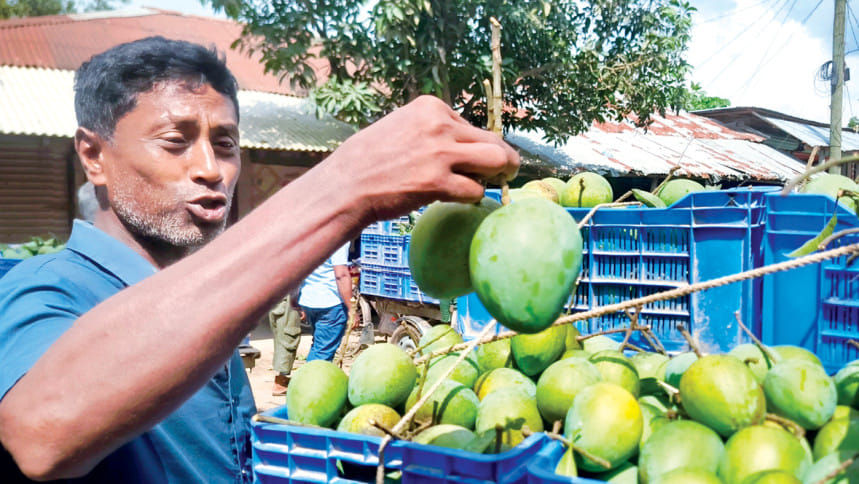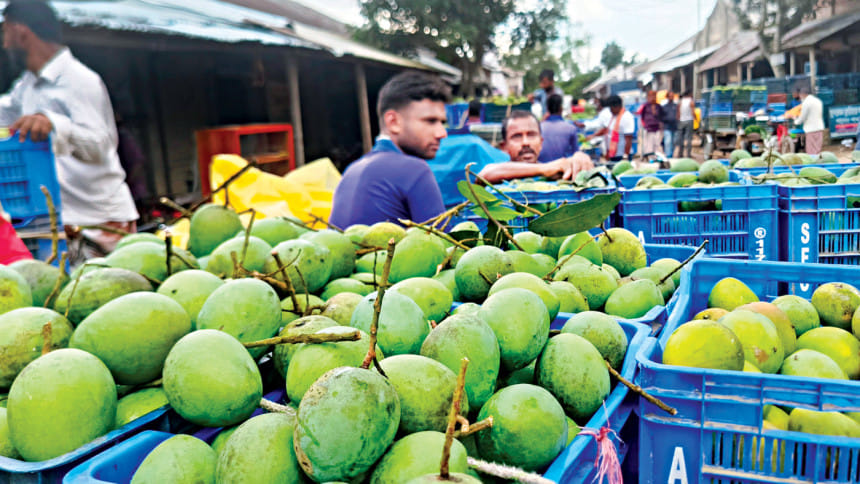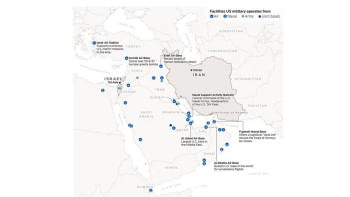Haribhanga dominates mango markets in the north

With the intense summer heat ripening fruits earlier than expected, the famed variety of Haribhanga mango from Rangpur has hit the markets five days ahead of schedule.
The seasonal mango trade officially began on June 15, and already over a dozen markets have sprung up across Mithapukur and Badarganj upazilas -- Padaganj being the largest among them.
From early morning till evening, the marketplaces are abuzz with activity. Mango growers are bringing their harvests directly to buyers, while traders and customers from across the region, and even other districts, are flocking to secure their share of the beloved fruit.
From permanent fruit shops to makeshift roadside stalls, Haribhanga now dominates every corner of the local fruit scene. Its popularity is not limited to Rangpur alone -- boxes are being couriered nationwide and even shipped abroad.
Data from DAE in Rangpur shows that Haribhanga mangoes are being cultivated on 2,567 hectares of land across Rangpur, Lalmonirhat, Kurigram, Gaibandha, and Nilphamari -- an 11-hectare increase from last year.
According to farmers, traders, and buyers, both supply and prices of Haribhanga mangoes are satisfactory this season.
Data from the Department of Agricultural Extension (DAE) in Rangpur shows that Haribhanga mangoes are being cultivated on 2,567 hectares of land across Rangpur, Lalmonirhat, Kurigram, Gaibandha, and Nilphamari -- an 11-hectare increase from last year.
Of this, 1,915 hectares are in Rangpur district alone, with 80 percent of production concentrated in Mithapukur and Badarganj upazilas.
The projected output for the current season stands at 39,006 tonnes, with an estimated market value exceeding Tk 140 crore.
"At least 400 tonnes of mangoes are bought and sold here every day," said Sumon Islam, a mango trader at Padaganj Bazar of Mithapukur.
"The market is now lined with temporary courier service booths through which buyers are sending mangoes to Dhaka and other districts," he shared.

He added that the market will run through July, and many wholesalers are purchasing mangoes here in bulk to distribute to smaller retail outlets across the country.
Meher Ali from Padaganj village said he has been cultivating Haribhanga on one hectare of land for the past six years, producing 14-15 tonnes annually.
"This year the fruit size is better. Despite some loss due to nor'westers, the overall quality is excellent. We are selling at Tk 27-33 per kg," he said adding, "Mango farming has made us self-reliant."
Ruhul Amin, a fruit trader from Lalmonirhat, said he buys mangoes directly from farmers every day at Padaganj and nearby markets, incurring a cost of Tk 30-35 per kg, including transportation. The same mangoes are sold in retail markets at Tk 45-50.
"Buyers now ask only for Haribhanga. There's no demand for other varieties," he said. "This is our most profitable season."
Sujon Saha, a buyer from Rangpur city, shared that he bought 10 maunds (approximately 400kg) of Haribhanga mangoes from Padaganj -- keeping two maunds for his family and sending the rest to relatives in Dhaka via courier.
"I bought it at Tk 32 per kg here, while in the city's retail markets it costs around Tk 50. I'm very satisfied," he said.
DAE officials and locals said with its round-to-elongated shape, fibreless flesh, firm texture, and excellent shelf life, Haribhanga mango stands apart from other varieties. Thanks to its unique genetic traits, even wrinkled skins don't indicate spoilage. Its appeal is visual, nutritional, and gastronomic.
Last year, Haribhanga was granted Geographical Indication (GI) status.
Local orchard owners including Aminul Islam, Rafiqul Islam, Khurshed Alam and Moslem Uddin said they have already begun receiving export orders from Middle Eastern buyers this season.
Sirajul Islam, deputy director of the Rangpur DAE, said, "Although the official harvesting date was set for June 20, the early heat caused the mangoes to ripen faster. So, we approved harvests from June 15."
He added, "Haribhanga originated from Tekani village at Khoragachh union of Mithapukur upazila. Today, the mango is cultivated in over 80 villages across Mithapukur and Badarganj, transforming the lives of many farming families."

 For all latest news, follow The Daily Star's Google News channel.
For all latest news, follow The Daily Star's Google News channel. 



Comments